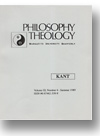|
articles |
|
1.
|
Philosophy and Theology:
Volume >
3 >
Issue: 4
Diana E. Axelsen
Kant’s Metaphors for Persons and Community
abstract |
view |
rights & permissions
| cited by
I argue that, although it is probably not possible to construct a thoroughly consistent interpretation of Kantian metaphors, there is a perspective in Kant’s later writings which provides a framework for selecting and sorting central metaphors. Following a discussion of the work or Lakoff and Johnson on metaphor, I provide an examination of Kant’s distinction between noumenon and phenomenon as an example of a metaphor grounded upon spatio-temporal experience, and conclude with suggestions concerning the role of metaphor in Kant’s account of personhood and community.
|
|
|
|
|
2.
|
Philosophy and Theology:
Volume >
3 >
Issue: 4
Robert Gibbs
Fear of Forgiveness:
Kant and the Paradox of Mercy
abstract |
view |
rights & permissions
| cited by
I first argue that Kant must consider the question of forgiveness by tracing his thought from the concept of the purity of practical reason, through the postulate of God’s existence, and to the relations between God and humanity as both merciful and as just. I then examine the text where he recognizes the paradoxical relation of justice and mercy. Ultimately, the existence of the world displays a mercy which suspends strictest justice. Kant refuses to think through this paradox, and I argue that his refusal reflects his more basic compulsion to make ethics rational. The consequences of the paradox are a limitation of autonomy.
|
|
|
|
|
3.
|
Philosophy and Theology:
Volume >
3 >
Issue: 4
John L. Treloar
The Crooked Wood of Humanity:
Kant’s Struggle With Radical Evil
abstract |
view |
rights & permissions
| cited by
During the latter part of his career, Kant proposes three different accounts of evil. In these accounts are found psychological, logical, and teleological elements intetwoven in such a way as to give a coherent reading of evil as a complex philosophical issue. Recent commentators have emphasized one or the other of these two elements and consequently have only given a partial picture of Kant’s struggle with evil. I argue that Kant’s use of scripture needs to be taken much more seriously than it has been taken in order to unify these psychological, logical, and teleological aspects of his treatment.
|
|
|
|
|
4.
|
Philosophy and Theology:
Volume >
3 >
Issue: 4
Stephen R. Palmquist
Kant’s Critique of Mysticism:
(1) The Critical Dreams
abstract |
view |
rights & permissions
| cited by
This is a series of two articles examining Kant’s attitude toward mystical experiences and the relation between his interest in these and his interest in constructing a Critical system of metaphysics.“The Critical Dreams” begins by questioning the traditional division between “Critical” (1770 onwards) and “pre-Critical” periods in Kant’s development. After explaining Kant’s Critical method, his 1766 book, Dreams of a Spirit-Seer ... is examined and found to contain all the essential elements of that method. The onlykey element which is missing is his “Copernican” insight. Although Hume may have played an important role in the early 1760’s in awakening Kant to the importance of his Critical method, this Copernican insight seems to have its roots more in Swedenborg than in Hume. Moreover, [DREAMS] itself should no longer be interpreted as evincing a sceptical or empirical stage in Kant’s development, but can now be seen as setting for Kant the problem which his Critical System was intended to solve. [DREAMS] suggests the two strands of this problem: (1) How is mystical experience possible? and (2) How is metaphysics possible? [DREAMS] offers a Critical answer to the first question, but does not fully develop its implications.
|
|
|
|
|
5.
|
Philosophy and Theology:
Volume >
3 >
Issue: 4
Ronald M. Green
The Leap of Faith:
Kierkegaard’s Debt to Kant
abstract |
view |
rights & permissions
| cited by
Following an introductory examination of possible reasons why past researchers have overlooked Kierkegaard’s debt to Kant, two specific areas of influence are documented and analyzed: the ideality of ethics, and the notion of faith as a leap. Closing remarks suggest that there are other areas as yet undocumented.
|
|
|
|
|
6.
|
Philosophy and Theology:
Volume >
3 >
Issue: 4
Andrew Tallon
Editor’s Page
view |
rights & permissions
| cited by
|
|
|
|
